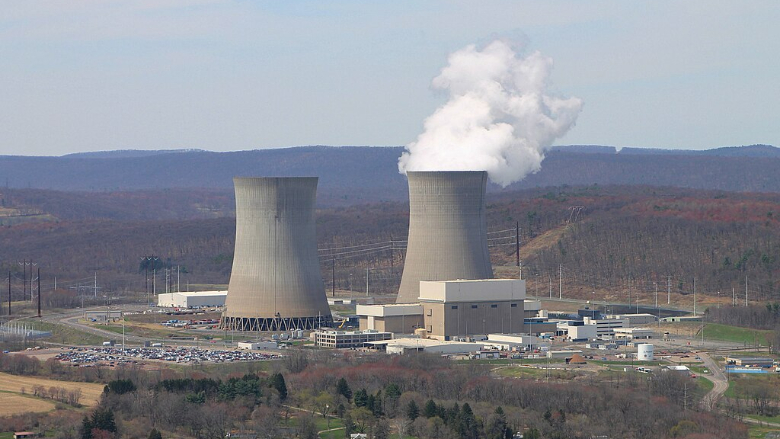Energy
FERC Rejects Grid Connection Pact for Amazon Pa. Data Centers

Talen Energy Corp. says Amazon has planned up to 960 MW of data centers connected directly to its Susquehanna Steam Electric Station, a nuclear power plant in eastern Pennsylvania.
Photo cropped from the original by Jakec/CC BY-SA 4.0
Talen Energy Corp. says it can still develop the first phases of a planned Amazon Web Services data center at the site of its Susquehanna nuclear power plant even after the Federal Energy Regulatory Commission rejected on Nov. 1 an amended grid connection agreement with operator PJM Interconnection LLC that would have allowed it to increase the amount of power available to the data center through a direct connection.
PJM Interconnection, which operates in 13 Northeast and Midwest states, filed the agreement, known as an ISA, along with Talen’s Susquehanna Nuclear LLC and local utility company PPL Electric Utilities Corp., earlier this year concerning the Susquehanna plant—a 2,520-MW facility in Luzerne County, Pa. They sought to update an existing agreement to increase the amount of co-located load from 300 MW to 480 MW and make other revisions.
But the energy regulator's commissioners voted 2-1 to reject the deal, finding that the applicants “failed to meet the high burden” for proving the amended provisions are necessary. In its order, written by Acting Deputy Secretary Carlos Clay, FERC questioned whether PJM intends to offer the terms to similarly situated interconnection customers, even though the company had claimed that the proposed amendments were developed to address the circumstances of this particular interconnection.
“Talen believes FERC erred and we are evaluating our options, with a focus on commercial solutions,” the energy firm said in a statement.
The company previously reached a deal to sell the data center campus to Amazon for $650 million and supply it with power for the facility. Plans shared by Talen indicate Amazon could develop the campus up to 960 MW. Talen said it would pursue approval of the amended ISA while development of early project phases proceeds with the available 300 MW of co-located load.
FERC did not address other issues raised during the process, such as whether agreements like this could impact grid load or if costs would be passed on to other power customers.
The commissioners’ decision came the same day FERC was hosting a technical conference on large power loads co-located at generating facilities. Talen said in its statement that the co-location arrangement with Amazon “is part of the solution” to the issues raised at the conference.
“It brings service to the customer quickly and without expensive transmission upgrades necessary to serve large-load demand,” Talen said.
'Not The Final Word'
The rejection comes after Constellation Energy Corp. announced that it would restart Three Mile Island Nuclear Station’s unit 1 in Middletown, Pa., as part of a 20-year agreement with Microsoft Corp. to power its data centers.
Speaking to investors on a quarterly financial results call Nov. 4, Joseph Dominguez, developer president and CEO, said the FERC ruling “is not the final [agency] word on co-location,” and that he expects it will provide more guidance. Co-location “remains one of the best ways for the U.S. to quickly build the large data centers that are necessary to lead on [artificial intelligence],” he said.
Dominguez also outlined how he believes co-location should work. Power should always go to the grid first during an emergency, he said. If a co-located load has backup power, it should be able to offer that power to the grid, subject to permitting rules. Also, the co-located load should have to pay its share of grid costs for what it uses.
“Frankly, I think part of the issue with the [agreement] proceeding is that it did not bring these issues together and, understandably, some of the commissioners want to see the complete package,” he said.
Constellation will seek regulatory clarity while also pursuing commercial strategies for co-location that are permitted under existing rules, Dominguez added.




